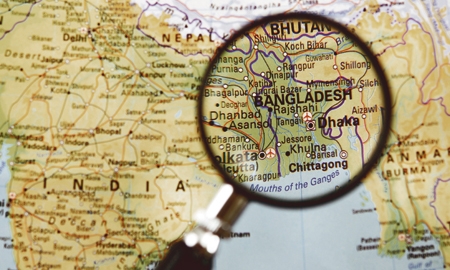Bangladesh, less than a quarter of the size of Texas, is the heart of South Asia. Once part of the Indian subcontinent under British rule and then cut from India thus becoming East Pakistan in 1947, the People’s Republic of Bangladesh finally became an independent nation in 1972 after a bitter conflict over the right to use the Bengali language and the right to govern themselves democratically.
Since independence, the fighting spirit of the people has lived on, and despite their struggle with natural calamities and political unrest, they have defied the odds and battled on to become a land of opportunity.
The now vibrant economy of Bangladesh (which has grown between 5% and 6% per year since 1996) still remains a widely open market, but with a young population of approximately 160 million and its strategic position at the core of South Asia, nobody can deny that this small country looks set for rapid development.
The Bangladeshi people are some of the most hospitable in the world, always welcoming with a ready smile and happy to help. It is that nature which makes them excellent business partners and is propelling Bangladesh into the limelight as the next destination for foreign direct investment in a variety of sectors, as well as for joint ventures that are proving to be exceedingly lucrative.
“When it comes to branding, I think our new entrepreneurs have a very good opportunity now, particularly when it comes to working with other large companies and major importers around the world,” stresses Akramul Qader, Bangladeshi Ambassador to the U.S.
Indeed, ‘Made in Bangla-desh’ is a label – not only for its well-known ready-made garments but also for pharmaceuticals and bone china, for example – that is rapidly becoming more commonplace. Currently Bangladeshi garment manufacturers are second only to China in their offerings to the world and the United States is the number one importer of Bangladeshi products.
We are a muslim country, but our people are very tolerant and we do not have problems like in other countries when it comes to religious freedom Akramul Qader, Bangladeshi Ambassador to the U.S. |
According to Ambassador Qader, Bangladesh exported $4.23 billion worth of goods in 2010-2011, despite the lack of a free trade agreement – something he would like to change in the future. “We had to pay something like $657 million in penalties, which is way too high if you compare it to other countries. If we were allowed duty free and quota free exports of goods, particularly garments, we could divert this to important areas including women’s empowerment,” he remarks.
Aside from partnering with local entrepreneurs, U.S. investors will find plenty of plans and projects in need of foreign know-how and funding. Once completed, these will only add to Bangladesh’s growing potential as a regional economic power and boost social development.
“I think the potential here is easy to recognize and investors will continue to come and invest in Bangladesh,” says Minister of Finance Abul Maal Abdul Muhith. “Billions of dollars need to be invested in power, roads, highways and obviously in railways. So, we’re appealing for higher foreign investment and higher foreign assistance. I must say we are receiving strong responses from investors.”
With the eighth-largest population in the world, Bangladesh is certainly a country to be considered on the global economic stage. It is also making waves regionally in terms of social progress. Although Bangladesh is a predominantly Muslim nation, it stands out as an international example for many countries in terms of women’s empowerment. Both the current Prime Minister, Sheikh Hasina, and the leader of the opposition party, Khaleda Zia, are women, as is the Minister of Foreign Affairs, Dr. Dipu Moni.
A country which has been recognized by Goldman Sachs in the world’s list of
"N-11", or next eleven economies, which has provided the UN with more peacekeepers than any other, and which strides forth tackling challenges and exceeding expectations – Bangladesh has a private sector made up of outstanding entrepreneurs who are making the future bright for their people.
These ‘Best of Bangladesh’ are recognizing opportunities and creating world-class corporations. Their examples of what can be done in Bangladesh show that the sky is the limit.

0 COMMENTS